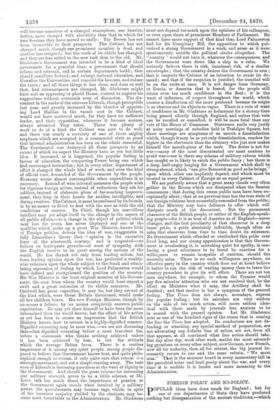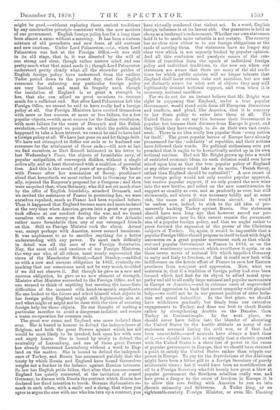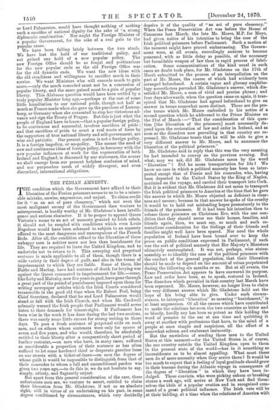FOREIGN POLICY AND NO-POLICY.
DI °PULAR ideas have done much for England ; but for one of our departments of State they have produced nothing but disorganization of the ancient traditions,—which might be good,—without replacing those ancient traditions by any constructive principle consistent with the new motives of our government. English foreign policy has for a long time been almost a name without a meaning. It has been a curious mixture of old precedents and new fears, of old customs and new cautions. Under Lord Palmerston,—i.e., when Lord Palmerston was last at the Foreign Office,—it was still in its old stage, that is, it was directed by the will of one strong and clear, though rather narrow mind, and was pretty much what that mind made it ; though Lord Palmerston understood pretty clearly what all the shrewder guides of English foreign policy have understood from the earliest Tudor period down to the present day, that the Euglish resources for enforcing any particular foreign policy are very limited, and must be frugally used, though the insulation of England is so great a strength to her, that she can afford on great occasions to venture much for a sufficient end. But after Lord Palmerston left the Foreign Office, we cannot be said to have really had a foreign policy at all. Our Foreign Ministers have exerted themselves with more or less success, or more or less failure, for a few popular objects,—with most success for the Italian revolution, with most failure for the cause of Denmark and the Polish revolution,—but except on points on which the public mind happened to take a keen interest, we cannot be said to have had a foreign policy at all. We have just gone on and let things drift. We have not attempted to define our ends or to husband our resources for the attainment of those ends ;—till now at last we find ourselves, as Earl Russell intimated in his letter to last Wednesday's Times, the objects of formidable envy, of popular antipathies, of convergent dislikes, without a single active ally, and at least threatened with a coalition of powerful foes. And this is the result of years of no-policy. We broke with France after her annexation of Savoy, proclaimed aloud that henceforth we must rather look to Germany for an ally, rejected the Emperor's proposal for a Congress ; and then were surprised that, when Germany, who did not set much store by the offer of English friendship, attacked Denmark, and we invited the assistance of France in protecting her, we were ourselves repulsed, much as France had been repulsed before. Thus it happened that England became more and more isolated at the very time when America, grown into a great war power, took offence at our conduct during the war, and we found ourselves with an enemy on the other side of the Atlantic rather more formidable than any of our estranged friends on this. Still no Foreign Minister took the alarm. Actual war, except perhaps with America, never seemed imminent. It was unpleasant to us to sacrifice anything for a better understanding with any power. To meet each difficulty in detail was all the care of our Foreign Secretaries. Nay, the most cold and cautious of our Foreign Ministers, the very one who, of all others, most nearly represented the views of the Manchester School,—Lord Stanley,—saddled us with a new and onerous obligation in 1867, cynically re- marking that our conscience need not be very much troubled if we did not observe it. But though he gave us a new and onerous obligation, he gave us no new element of strength. Minister after Minister succeeded to the Foreign Office, and no one seemed to think of anything but meeting the immediate difficulties of the moment with hand-to-mouth expedients. No one looked to the future and asked himself what objects in her foreign policy England might still legitimately aim at, and what might or might not be done with the view of securing foreign help for these objects. No one thought of making a particular sacrifice to avoid a dangerous isolation and secure a warm co-operation for common ends.
The great war came, and England was more isolated than ever. She is bound in honour to defend the independence of Belgium, and both the great Powers against which her aid would be most likely to be invoked, look upon her with sore and angry hearts. She is bound by treaty to defend the neutrality of Luxemburg, and one of those great Powers has already threatened Luxemburg without a word to Eng- land on the matter. She is bound to defend the independ- ence of Turkey, and Russia has announced publicly that the treaty by which Russia and England have bound themselves weighs not a feather in the balance against Russian interests. So low has English pride fallen, that after that announcement England has quietly consented, at the invitation of armed Germany, to discuss with Russia the contract which Russia has declared her fixed intention to break. German diplomatists re- mark to each other, with a smile and a shrug, that when you agree to argue the case with one who has torn up a contract, you have virtually condoned that violent act. In a word, English foreign influence is at its lowest ebb. Our guarantee is held as cheap as a bankrupt's endorsement. Whether our own statesmen hold it to be much more valuable is not certain. The country has no clear view either as to our foreign obligations or the mode of meeting them. Our statesmen have no longer any clear view which is not urgently backed by popular opinion. And all this confusion and paralysis comes of the con- dition of transition from the epoch of individual foreign policy and individual traditions, to the new era when our statesmen are aware that there are many of the old tradi- tions for which public opinion will no longer tolerate that England shall incur serious risks and sacrifices, but are not yet distinctly aware for what sort of objects they may still legitimately demand national support, and even when it is necessary, national sacrifices.
For we do not for an instant believe that Mr. Bright was right in supposing that England, under a true popular Government, would stand aside from all European discussions and conflicts, and plead, like America, that it is contrary to her State policy to enter into them at all. The United States do not say this because their Government is popular, but because their distance from Europe is great, and they think they have enough to do on their own vast conti- nent. There is no idea really less popular than every nation for itself.' The great popular heroes of Europe have already pronounced for the 'solidarity' of republics, and their actions have followed their words. No political enthusiasm ever yet preached that it ought to be hermetically sealed up in its own national receiver. Had not Mr. Bright grown up into a world of restricted economic ideas, no such delusion could ever have Seized upon him as that the true popular policy of England or any other country could take as its motto, Perish Savoy, rather than England should be embroiled!' A new recast of our foreign policy would not only receive popular approval,
but receive popular support, if we only poured the new wine into the new bottles, and relied on the new constituencies to
support as steadily as ever, and as prudently as ever, but still strenuously, and where it was necessary boldly and at some riek, the cause of political freedom abroad. It would.
be useless now, indeed, to stick to the old idea of per- manently backing Turkey against Russia. Our statesmen should have seen long ago that however sacred our pre- sent obligations may be, this cannot remain the permanent aim of a popular foreign policy, and that we ought rather to press forward the expansion of the power of the Christian subjects of Turkey. So, again, it would be impossible that a
popular Foreign Office should propose to itself to look with frigid unconcern on a great popular movement such as that which
restored popular Government in France in 1848, or on the violent reactionary movement which overthrew it again, or on those newer waves of national life which impelled Germany to unity and Italy to freedom, or that it could now look with indifference on the heroic effort of France to save her Eastern provinces from conquest and oppression. Now, what we maintain is, that if a tradition of foreign policy had ever been formed which had had for its object to afford moral sym- pathy and aid to all really large national and popular movements in Europe or America,—and in extreme cases of unprovoked external aggression to back that moral sympathy with physical help,—we could not be in our present position of utter isola- tion and moral imbecility. In the first place, we should have withdrawn gradually but firmly from our extensive engagements to Turkey, and done our best to check Russia rather by strengthening Austria on the Danube, than
Turkey at Constantinople. In the next place, we should never have fallen into the blunder of alienating
the United States by the hostile attitude so many of our statesmen assumed during the civil war, or if that had been unavoidable,—and neutrals have always a hard time
of it,—we should have felt so strongly that a chronic quarrel with the United States is a sheer loss of power to the cause of popular government in Europe, that we should have strained a point to satisfy the United States rather than cripple our
power in Europe. To pay for the depredations of the Alabama might have been a bitter pill to a foreign Secretary of purely
aristocratic views ; but it would have been no mortification at all to a Foreign Secretary who felt keenly how great a blow at popular government the Southern rebellion really was, and
how great a danger to the cause of freedom in Europe it is to allow this sore feeling with America to run on into chronic animosity and bitterness. A Tudor king, or an eighteenth-century Foreign Minister, or even Mr. Canning or Lord Palmerston, would have thought nothing of making such a sacrifice of national dignity for the sake of a strong diplomatic combination.' Nor ought the Foreign Minister of a popular Government, for the sake of a real gain to the popular cause. We have been falling lately between the two stools. We have lost the hold of our traditional policy, and not gained any hold of a new popular policy. The new Foreign Office should be as frugal and pertinacious for the new popular ends as the old Foreign Office was for the old dynastic ends. We want the new ideas with the old steadiness and willingness to sacrifice much in their service. We want Ministers who will concede much to gain inore,—only the much conceded must not be a concession of popular liberty, and the more gained must be a gain of popular liberty. This Alabama question would have been settled by a truly popular Minister long ago,—perhaps at the cost of some little humiliation to our national pride, though not half as much as France made when she gave up the purchase of Luxem- burg, or Germany when she consented to stop her victorious ad- vance and sign the Treaty of Prague. But this is just what the people of England have to learn—that a popular foreign policy, to be continuous and successful, involves sacrifices of pride ; and that sacrifices of pride to avert a real waste of force by the supporters of true national liberty and self-government, are wise and patriotic. Our present system is not a foreign policy. It is a foreign impolicy, or no-policy, The sooner the need of new and continuous ideas of foreign policy, in harmony with the new popular influences at work for the regeneration of both Ireland and England, is discerned by our statesmen, the sooner we shall emerge from our present helpless confusion of mind, and our purposeless mesh of widely divergent, and even discordant, international obligations.




































 Previous page
Previous page